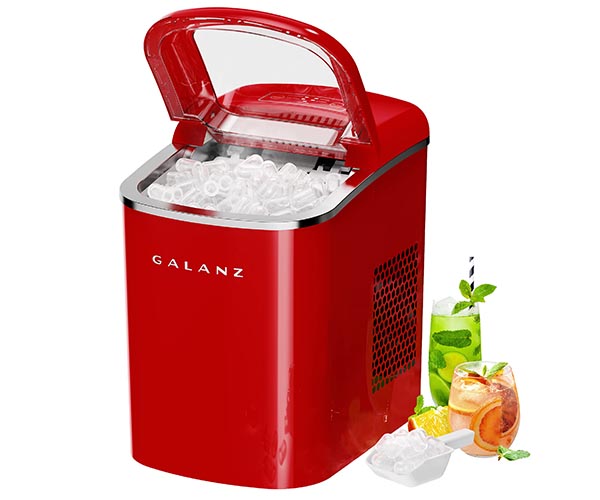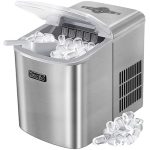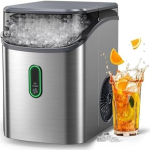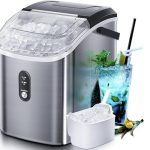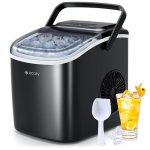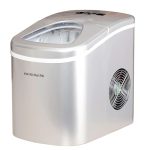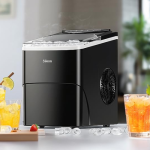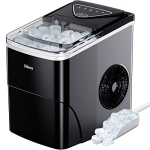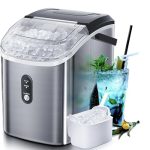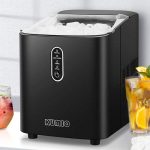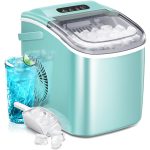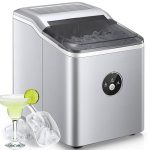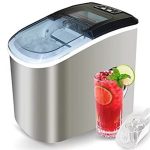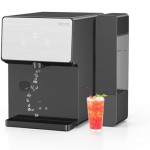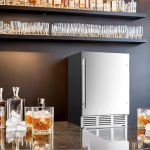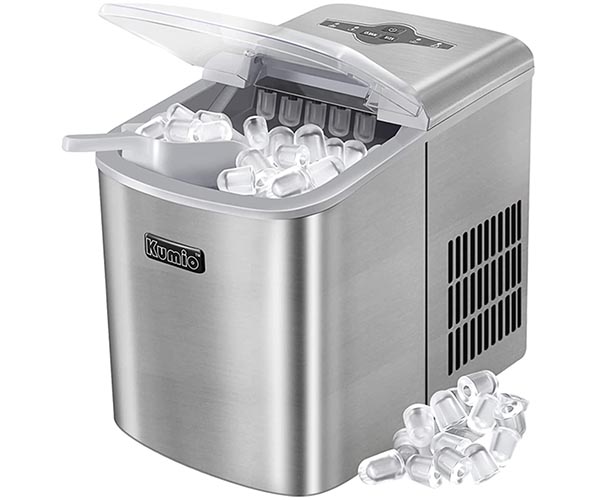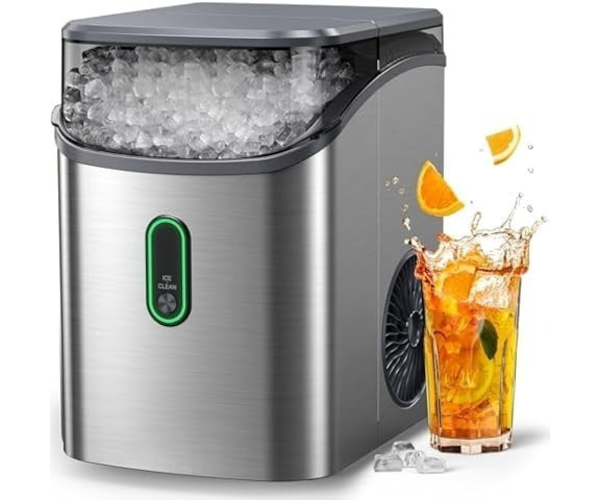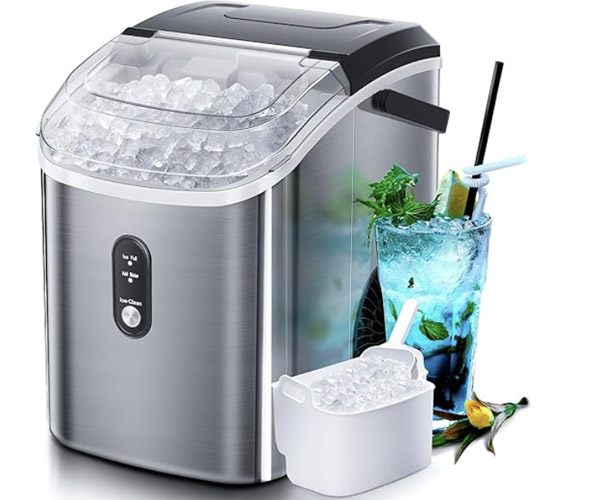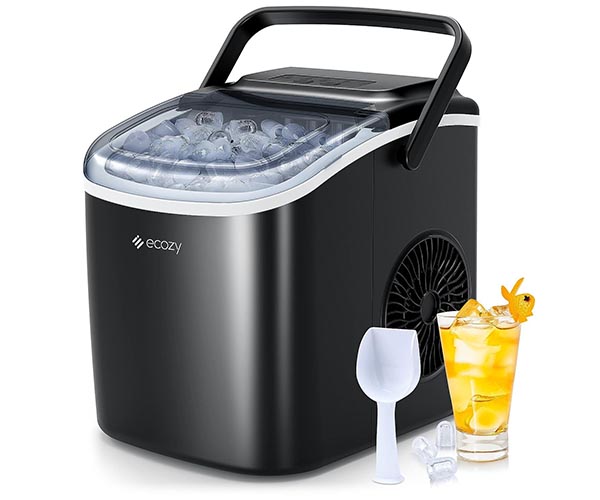Introduction
Imagine preparing for a summer backyard party, everything set for a day of fun and relaxation with friends and family. As the first guests arrive and you serve up chilled drinks, you notice the ice cubes are not quite right—they’re cloudy and have a slight odor. The culprit? An overdue filter change in your countertop ice maker. This common oversight can dramatically affect the taste and quality of your ice, turning an otherwise perfect setup into a source of discomfort for you and your guests.
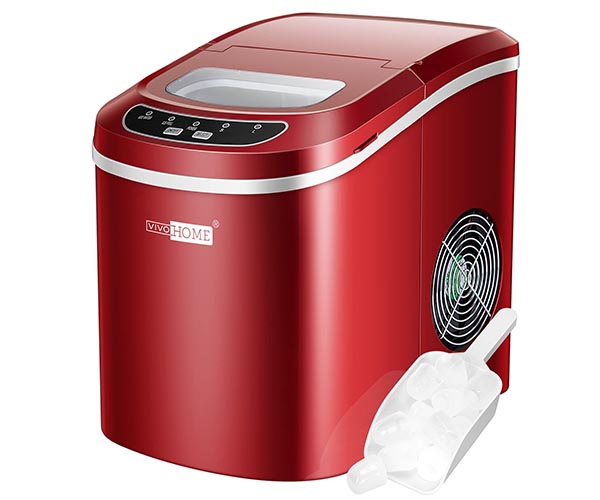
The Importance of Filter Replacement
Regularly replacing the filter in your countertop ice maker isn’t just about maintaining the aesthetic appeal of clear, taste-free ice—it’s also critical for the appliance’s overall health and efficiency. Filters play a key role in removing impurities and minerals from your water, which, if left unchecked, can lead to build-ups that impair the functionality of your ice maker and shorten its lifespan. Ensuring you change the ice maker’s filter as recommended can thus save you from unexpected breakdowns and costly repairs, all while ensuring each glass you serve is accompanied by the perfect ice cube. https://amzn.to/3WoePQf
Understanding Ice Maker Filters
To ensure your ice is always clear and tastes fresh, it’s crucial to understand the role of filters in your ice maker and the different types available.
Role of Filters
Filters in ice makers serve several important functions:
- Remove Impurities: The primary role of a filter is to cleanse the water used in your ice maker by removing impurities such as chlorine, sediment, and other contaminants. This process is essential for enhancing both the taste and clarity of the ice.
- Prevent Scale Buildup: Filters help reduce mineral deposits in the water. These minerals, if left unfiltered, can lead to scale buildup inside the machine, affecting its efficiency and longevity.
- Enhance Appliance Longevity: By keeping the water clean and free of heavy sediments, filters contribute significantly to the overall health of your ice maker, ensuring it operates smoothly for a longer period.
Types of Filters
Different types of filters are used in countertop ice makers to achieve these purification goals:
- Charcoal or Carbon Filters: These are the most common types of filters used in ice makers. Activated charcoal effectively absorbs impurities and odors, leaving the water clean and fresh. These filters are excellent for removing chlorine and improving taste and odor.
- Sediment Filters: These filters are designed to remove solid particles such as dirt, rust, and sediment from the water. They are often used in conjunction with charcoal filters to ensure comprehensive water purification.
- Scale Inhibitor Filters: Some ice makers use filters that include scale inhibitors, which reduce the hardness of the water, preventing mineral buildup that can clog and damage the machine’s internal components.
Understanding these filters and their specific roles helps in choosing the right type for your ice maker, based on your local water conditions and the specific needs of your appliance. Regular replacement and maintenance of these filters are key to maintaining the optimal performance of your countertop ice maker.
Replacement Frequency Guidelines
Knowing when to replace the filters in your countertop ice maker is crucial for maintaining the quality of ice and the efficiency of your appliance. Here’s how to determine the right time for a filter change.
Manufacturer’s Recommendations
- General Guidelines: Most manufacturers recommend replacing the ice maker filters every six months to ensure optimal performance. However, this can vary depending on the model and usage, so it’s important to consult your ice maker’s user manual for specific guidance.
- Based on Usage: For ice makers that are used more frequently, especially in commercial settings, the filters may need to be changed more often than the standard recommendation to maintain the best quality ice.
Signs It’s Time to Replace
Even with general guidelines in place, there are clear indicators that can alert you when a filter change is necessary:
- Changes in Ice Taste: If you notice a sudden change in the taste of the ice, this can indicate that the filter is no longer effectively removing impurities and contaminants.
- Unpleasant Odor in Ice: Any emerging odors from the ice cubes are a strong indicator that the filter needs to be replaced, as it may be saturated with contaminants that are affecting the ice’s smell.
- Reduction in Ice Production Speed: A noticeable slowdown in ice production can suggest that the filter is clogged, restricting water flow to the ice maker and thus reducing its efficiency.
By adhering to the manufacturer’s recommendations and being vigilant about the signs of a failing filter, you can ensure that your countertop ice maker continues to produce high-quality ice and operates efficiently. Regular filter replacements are a simple yet critical part of maintaining your ice maker’s longevity and performance.
Step-by-Step Guide to Replacing Filters
Maintaining your countertop ice maker includes regular filter checks and replacements to ensure it continues to produce high-quality ice. Here’s a straightforward guide on how to replace the filters effectively.
When to Check
- Regular Cleaning Sessions: It’s a good practice to check the condition of your ice maker’s filter each time you clean the machine. This consistent check helps you monitor the filter’s condition and replace it before any issues arise.
- Scheduled Inspections: Besides checking during cleaning, set a reminder to inspect the filter every three months, especially if your ice maker is heavily used, to ensure it hasn’t reached its capacity sooner than expected.
How to Replace the Filter
Replacing the filter in your countertop ice maker can be straightforward if you follow these detailed steps:
- Locate the Filter: First, identify where the filter is located on your ice maker. Most are easily accessible from the front or side compartment.
- Prepare the Area: Ensure your ice maker is turned off and unplugged before attempting to replace the filter to avoid any electrical hazards.
- Remove the Old Filter:
- Gently remove the old filter according to the manufacturer’s instructions. Some filters twist off, while others might require pressing a release button.
- Install the New Filter:
- Take the new filter and align it with the connection points inside the compartment. Twist or click it into place as required by your specific model.
- Make sure it is securely installed to prevent any leaks or operational issues.
- Flush the System:
- Once the new filter is installed, plug in and turn on your ice maker. Run a few cycles without producing ice (if your model allows) or discard the first batch of ice made after the filter change to ensure any carbon residue or impurities are flushed out.
- Check for Leaks: After replacing the filter and running the initial cycles, check around the filter compartment for any signs of leaks. Address any leaks immediately to prevent water damage or operational problems.
- Record the Date: Keep a record of when you replaced the filter to help track when the next change is due. This can be on a physical calendar or a digital reminder.
Where to Purchase Replacements
- Manufacturer’s Website: The safest option for purchasing replacement filters is directly through the manufacturer’s website, where you’re guaranteed to find the correct model for your ice maker.
- Home Appliance Stores: Most home appliance stores carry a variety of ice maker filters. Ensure you have the correct model and type before purchasing.
- Online Retailers: Websites like Amazon or eBay can also be good sources for replacement filters. Be sure to read reviews and confirm the compatibility of the filter with your ice maker model.
By following these steps, you can ensure your ice maker continues to function optimally with fresh, clean-tasting ice. Regular filter replacement is key to extending the life of your appliance and maintaining its efficiency. https://amzn.to/3WoePQf
Factors Affecting Filter Lifespan
The lifespan of a filter in your countertop ice maker can vary significantly based on several factors. Understanding these can help you better manage filter replacements and ensure continuous high-quality ice production.
Water Quality
- Heavy Minerals: Water that contains high levels of minerals, particularly calcium and magnesium (known as hard water), can greatly reduce the lifespan of an ice maker filter. These minerals tend to build up within the filter, clogging it and reducing its efficacy more quickly than expected.
- Treatment Chemicals: Additionally, water treated with chemicals like chlorine can also wear out filters faster, as the filter works harder to remove these impurities to maintain the taste and clarity of the ice.
Frequency of Use
- Higher Usage Rates: The more frequently your ice maker is used, the quicker the filter will reach its capacity. Frequent cycles mean more water passes through the filter, accumulating impurities and leading to faster saturation of the filtering agents.
- Commercial vs. Residential Use: In commercial settings where ice makers are used almost continuously, filters may need to be changed more frequently compared to those in residential settings due to the sheer volume of water being processed.
By monitoring the quality of your water and adjusting filter changes based on how often you use your ice maker, you can help extend the life of your machine and ensure it produces the best quality ice possible. Always be proactive about replacing the filter when you notice changes in ice quality or if the machine starts operating less efficiently—these are signs that the filter may be due for a change.
Maximizing Your Filter’s Efficiency
To get the most out of your countertop ice maker’s filter and ensure it continues to produce high-quality ice, proper maintenance and careful selection of replacement filters are key. Here’s how you can maximize the efficiency of your ice maker’s filter.
Regular Maintenance
- Regular Inspections: Check your filter regularly for any signs of clogging or wear. This doesn’t mean you need to replace it immediately, but keeping an eye on its condition can help you anticipate changes before they impact ice quality.
- Cleaning the Filter: While not all filters are washable, some can be cleaned gently to remove surface debris. Check the manufacturer’s instructions to see if your filter can be cleaned and follow the recommended procedure if applicable.
- Pre-Filtering the Water: Consider using a pre-filter if your water source has high sediment content. A pre-filter can capture the larger particles before they reach your main filter, thereby extending its life and maintaining its efficiency.
Choosing Quality Replacements
- Compatibility: Ensure that the replacement filters are fully compatible with your ice maker model. Using the wrong type of filter can result in poor fit and leaks, reducing the effectiveness of the filter and potentially damaging your machine.
- Certified Filters: Opt for filters that are certified by relevant authorities such as NSF International, which guarantees that the filter meets specific standards for removing contaminants and improving water quality.
- Reputable Brands: Purchase filters from reputable manufacturers. High-quality filters may cost a bit more, but they generally last longer and perform better, providing value for money in the long run.
By maintaining your filter regularly and choosing high-quality replacements, you can ensure that your countertop ice maker remains efficient and continues to produce excellent quality ice. This proactive approach not only enhances the performance of your ice maker but also contributes to the longevity of the appliance.
Frequently Asked Questions About Countertop Ice Maker Maintenance
1. How often should I replace my ice maker’s filter?
Answer: Generally, it’s recommended to replace your ice maker’s filter every 6 months. However, if your water is hard or the ice maker is used frequently, you may need to replace the filter more often.
2. Can I clean my ice maker’s filter instead of replacing it?
Answer: Some ice maker filters are designed to be cleaned and reused, but many are not. Check your manufacturer’s guidelines to see if your filter can be cleaned and follow the specified instructions if it is possible.
3. How do I know if my ice maker’s filter needs to be replaced?
Answer: Signs that your filter needs replacing include a decrease in ice production, smaller or cloudy ice cubes, and unusual tastes or odors in the ice.
4. What type of filter does my countertop ice maker need?
Answer: The type of filter required depends on your ice maker model. Typically, charcoal or carbon filters are used. Always check your user manual or manufacturer’s website for specific filter requirements and recommendations.
5. Where can I buy replacement filters for my ice maker?
Answer: Replacement filters can be purchased from the manufacturer’s website, home appliance stores, or online retailers. Ensure you buy the correct model to guarantee compatibility and optimal performance.
6. Does using a filter in my ice maker really make a difference?
Answer: Yes, using a filter in your ice maker significantly improves the taste and clarity of the ice by removing impurities and minerals from the water. It also helps to prevent scale buildup inside the machine, enhancing its longevity and performance.
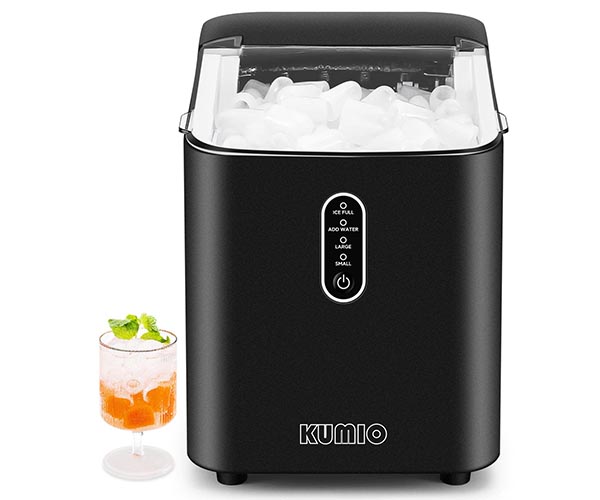
Conclusion
Ensuring your countertop ice maker operates efficiently and produces high-quality ice involves more than just occasional maintenance—it requires attention to the details, particularly when it comes to timely filter replacement. Regularly changing your ice maker’s filter is crucial for removing impurities from the water, which not only improves the taste and appearance of your ice but also protects the machine from scale buildup and wear, extending its lifespan and enhancing its performance.
Call to Action
Don’t wait for the signs of a worn-out filter, such as off-tasting ice or reduced ice production, to take action. Regularly check your ice maker’s filter and replace it as needed. Doing so will ensure your machine continues to operate at its best, providing you with fresh, clear ice every time. If you’re unsure about the type of filter your machine uses or when to replace it, consult your user manual or manufacturer’s website for guidance.
Looking for high-quality replacement filters? Visit reputable home appliance stores or browse trusted online retailers to find the right filter for your ice maker. Also, consider enrolling in a maintenance service that includes regular filter checks and replacements to keep your ice maker in top condition without the hassle.
Take this simple step today to maintain the efficiency and prolong the life of your countertop ice maker. Happy icing!
Additional Resources
Ensuring you have access to the right resources can make maintaining your countertop ice maker a breeze. Here’s where you can find high-quality filters and professional services that offer comprehensive maintenance packages, including filter changes.
Where to Buy Filters
- Online Retailers: Websites like Amazon, Home Depot, and Lowe’s offer a wide selection of ice maker filters. Ensure you know the specific model number of your ice maker to find compatible filters.
- Manufacturer Websites: For guaranteed compatibility and quality, purchase filters directly from the manufacturer of your ice maker. This can often be done through their website’s parts and accessories section.
- Specialty Appliance Stores: Stores that specialize in kitchen and home appliances typically carry a range of ice maker filters. Staff at these stores can also offer advice on the best options for your specific model.
Professional Services
- Appliance Repair and Maintenance Companies: Many companies offer maintenance packages for kitchen appliances, including ice makers. These services often include routine inspections, cleaning, and filter changes.
- Subscription Services: Some services offer subscription-based maintenance plans, where you can pay a monthly fee to have a professional come and service your ice maker regularly. This can include filter replacements as needed.
- Local Technicians: Check local listings for appliance technicians who specialize in ice maker maintenance. They often provide more personalized services and might offer regular maintenance contracts. https://amzn.to/3WoePQf
References
- GE Profile Opal Nugget Ice Maker Product Page
- NewAir Countertop Ice Maker Product Page
- Igloo ICEB26HNBK Portable Electric Countertop Ice Maker Product Page
- Scotsman SCN60PA-1SS
- EUHOMY Nugget Ice Maker Countertop
- Silonn Ice Maker Countertop
Additional Resources
- [How often should you clean your countertop ice maker?]
- [What happens if you don’t clean your countertop ice maker regularly?]
- [How does a countertop ice maker work?]
- [How to install a countertop ice maker?]
- [How often to descale a countertop ice maker?]
- [Buying Guide: Countertop Ice Makers with Water Line Connection]
- [Kitchen Upgrade Ideas: Countertop Ice Makers with Water Line]
- [Which countertop ice maker with freezer is best?]
These resources will not only ensure that you have access to the best possible filters but also help you keep your ice maker in optimal condition through professional maintenance services. Regular upkeep is key to extending the life of your appliance and ensuring it continues to produce high-quality ice.

